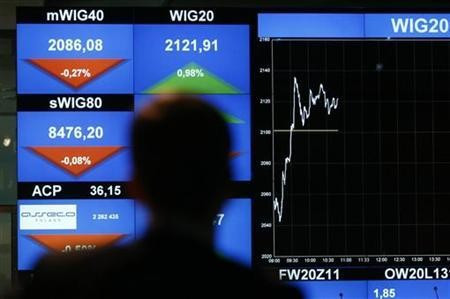European Stocks Cautious with Bank of Japan and US Earnings in Focus

European markets eased in the opening minutes of trade as investors considered Bank of Japan's aggressive stimulus measures ahead of major US earnings reports.
UK's FTSE 100 slipped 0.1 percent while Spain's IBEX fell 0.2 percent. Germany's DAX and France's CAC-40 eased 0.1 percent each.
Italy's FTSE MIB gained 0.4 percent. The FTSEurofirst 300 index covering the region's top shares slipped 0.1 percent to 1,165.52.
The single currency remained firm against the dollar, trading at about $ 1.33.
Asian markets had ended mixed earlier after the Japanese central bank announced plans to hike inflation targets and adopt US Federal Reserve-style asset purchase plan.
The Nikkei closed 0.35 percent lower to 10709.93 while South Korea's KOSPI gained 0.49 percent to 1996.52. Australia's S&P/ASX 200 added 0.03 percent to 4779.10.
China's Shanghai Composite Index fell 0.56 percent to close at 2315.14. Hong Kong's Hang Seng advanced 0.18 percent to 23634.34 towards finish.
Bank of Japan (BoJ) has said that it plans to double inflation targets to 2 percent and take up open ended asset purchase plan to boost the economy, after a two-day policy meet. The decision follows country's newly elected government's demands that BoJ should adopt aggressive stimulus measures to boost economy.
BoJ revealed that it will start buying about 13tn yen worth assets, which consist mostly of short term government bonds. The decision marked a major shift in BoJ's policy stand and has made investors take a bullish stand on Japan's future prospects. The country's economy is technically in recession after weak performance in two successive quarters as low global demand and inflation levels hurt growth.
Japanese stimulus measures are perceived positive for the region as a whole since it will improve demand, but analysts are not entirely convinced that the central bank measures are strong enough to help Japanese economy.
"The Bank of Japan's policy overhaul met the markets expectations and also managed to get the magic words 'open-ended easing' into the headlines," Julian Jessop, Chief Global Economist at Capital Economics.
"But it is debatable that the new 'open-ended' easing will result in any more asset purchases than would have happened anyway under the current policy of steadily increasing the ceiling on the Asset Purchase Programme".
US Earnings season remains in focus with corporate heavyweights such as Google, IBM and Johnson & Johnson reporting their fourth quarter earnings later in the day.
The eurozone finance ministers meet continues in Brussels. After selecting the group's next chairman and considering bailout issues earlier, the group is expected to give green signal to impose tax on all financial market transactions. The measure, which some expect to raise up to 20bn euros a year, has faced stiff criticism from countries such as UK.
Britain has made it clear that it will not adopt the tax, as it will impact deals in the crucial London market. The measure's supporters have claimed that it will discourage speculative activities, which many consider to destabilise markets.
Earlier the meeting selected the Dutch Finance Minister Jeroen Dijsselbloem as the group's next head, considered the financial support for Cyprus and reviewed conditions in other embattled economies in the region. The European Central Bank (ECB) president Mario Draghi is expected to make a speech later in the day.
German January ZEW survey figures are also expected during the day and analysts expect the index to have firmed to 15 from 6.9 in the previous month.
© Copyright IBTimes 2025. All rights reserved.


















